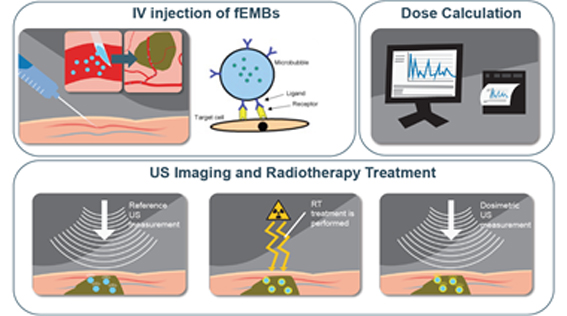Fraunhofer IBMT in the visionary EU-FET Open Project AMPHORA
New approaches for a more precise radiation therapy of cancer
Ultrasound expertise of the Fraunhofer Institute for Biomedical Engineering IBMT in the visionary EU-FET Open Project AMPHORA (Acoustic markers for enhanced remote sensing of radiation doses).



It is estimated that today about one in three people will develop cancer in the course of their lives and that this number will increase significantly in the coming years. Radiotherapy is a method of treatment that has been successfully used in about 50% of all cancer patients and has proven to reduce cancer-induced mortality. The malignant tumor is thereby exposed to a beam of high-energy photons, which are typically emitted by a linear accelerator. Thus, the success of the treatment depends on reaching a high tumor conformity, by maximizing the dose supplied to the tumor and, at the same time, keeping the exposure of the healthy tissue as small as possible. For this purpose, more complex treatment plans and dosage forms are used, which lead to highly modulated spatial and temporal radiation profiles. For ideal treatment of the tumor with minimal exposure of healthy tissue, irradiation must be planned in detail, using numerical models of in vivo radiation distribution to estimate the locally applied dose. Unfortunately, real-time methods for non-invasive dosimetry with high spatial and temporal resolution, which would allow ideal therapy monitoring, are not yet available.
Ultrasound contrast agents for dose-sensitive targeted systems
The innovative FET Open Project AMPHORA (Acoustic markers for enhanced remote sensing of radiation doses), funded by the Horizon 2020 programme of the European Commission, has set itself the goal of developing a real-time-capable non-invasive in-situ dosimetry system for radiation therapy. To this end, ultrasound contrast agents (UCAs, microbubbles) will be upgraded to injectable dose-sensitive and targeted systems that accumulate in tumor tissue and convert the applied radiation dose into a modulation of their acoustic reaction (backscatter signal) during ultrasound examination.
The main objectives of this visionary project, carried out by a consortium of European universities and non-university partners, include the design, development and optimization of targeted radiation-sensitive UCAs, that accumulate in (and around) the tumor and whose acoustic properties change depending on the radiation dose as well as the development of methods and systems for retrieving 3D dose distributions from volumetric ultrasound data. The evaluation and validation of the developed contrast agents, methods, algorithms and systems is to take place both in vitro and in vivo on the basis of small animal models (https://amphora-project.eu).
IBMT ultrasound expertise in use
Ultrasound is the most widespread approach in medical imaging. In addition, recent findings have promoted the use of ultrasound in therapy (HIFU, thermal ablation of tumors with ultrasound) and in therapy monitoring. Over the last decades, the Fraunhofer IBMT has gained a broad expertise in the development of advanced ultrasound technologies in hardware and software for a wide range of applications from cells to clinical use in humans (translation). In the AMPHORA project, the Fraunhofer IBMT will establish the technological basis for the proof-of-concept of high-resolution real-time radiation dosimetry. For this purpose, a novel 1024-channel ultrasound system is being developed that can be used in combination with matrix array transducers to record volumetric ultrasound data. The dosimetry algorithms developed by the project partners will be applied to this ultrasound data to calculate and visualize the locally applied radiation dose. The combination of real-time 3D ultrasound systems, radiation-sensitive acoustic contrast media and corresponding analysis algorithms migt enable for the first time the generation of in vivo real-time dose distribution maps for a more precise and safe therapy.
Visit us also at the
ICU - International Congress on Ultrasonics 2019
in Bruges, Belgium, 03.-06.09.2019
and on the
IEEE IUS 2019
in Glasgow, Great Britain, 06.-09.10.2019
www.ultrasound.fraunhofer.de
Project partners: KU Leuven, University Tor Vergata, DoseVue, IMEC, Erasmus University Medical Center
Funding: 3,9 M€
Period: 01.11.2018-31.10.2022